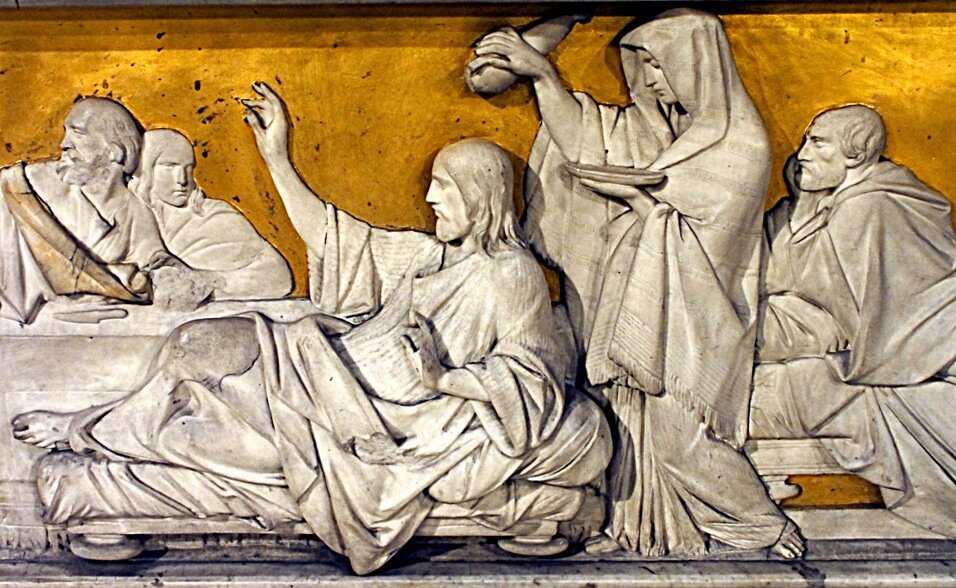I have been meditating on this passage for more than a week, through holy week and beyond! This is a wonderful story with multiple levels of meaning and insight. My focus in this post, however, concerns its message rather than the many points of exegetical interest.
The story beginning in verse 3 portrays an unknown woman approaching Jesus while he was having dinner at the home of Simon the leper. She breaks a flask of expensive perfume and uses it to anoint Jesus’ head. Others at the dinner party are outraged at the waste, and criticise her. They insist that the perfume could have been sold for 300 denarii—a year’s wages!—and the money given to the poor. But Jesus defends and commends her. She has done a beautiful thing for him, a good work of compassion. Somehow, she has insight into his approaching death and he interprets her anointing as an anointing for his burial, performed beforehand (a hint at his resurrection, that there will not be opportunity later, after his death, for the usual anointing?). Thus Jesus commands: “Leave her alone! Wherever the gospel is proclaimed in the whole world, what she has done will be told in memory of her.”
Morna Hooker’s comment captures something of the subtlety and complexity of Mark’s story:
If it seems strange that the story should be told as a memorial to a woman whose name Mark does not record, this is because it is what she has done that is all important. In pouring out her gift over his head, she has in one action anointed him Messiah, proclaimed his death and resurrection and made an act of total commitment to him as Lord: the story is itself a proclamation of the good news which is to be preached throughout the whole world (The Gospel According to Saint Mark, Black’s New Testament Commentaries, 330; emphasis added).
Mark has chosen this story to place at the beginning of his passion narrative, no doubt due to the reference to Jesus’ burial, and perhaps with a nod to his resurrection. But he has also set the passage in the midst of a story of conspiracy and betrayal (vv. 1-2, 10-11). This is a common literary device in Mark’s gospel, in which the ‘inserted’ story and its frame function together to provide an overarching message. In this case, the devotion of the woman as an exemplar of true discipleship is set off against the hatred of the religious leaders who cannot abide Jesus, and Judas’ betrayal of Jesus for a sum of money.
Her devotion is extravagant, an outpouring of love without limit. She breaks the flask, giving her all. Was she a wealthy woman? Was this her dowry? A gift from a husband? All she had left in the world? We do not know. But she gave it all. She gave it to Jesus in view of his approaching death. In some sense, she is echoing ahead of time, his own gift of his all.
The disciples rebuke her for her ‘waste,’ but Jesus rebukes them in turn. Nothing ever given to and for him is wasted, nor will it be forgotten. The gift may not be understood or appreciated by others. Some may see a Christian’s devotion as misguided, a waste of a life, a waste of resources, time and energy. But in the kingdom of God, nothing is wasted, nothing forgotten. Jesus receives it as a precious gift, something beautiful done for him.
Let me finish with another citation, this time from Donald Senior:
Wherever the gospel is preached her story will be told because this story is gospel, the ‘Good News’ of Jesus’ liberating death and the call to respond to it. Thus at the very beginning of the passion story, as opposition and treachery mount against Jesus, Mark lifts up an example of authentic discipleship. Not one of the twelve but a woman, whom the tradition has not even graced with a name, one shunted aside in a patriarchal culture, becomes the paradigm (The Passion of Jesus in the Gospel of Mark, 47; original emphasis).
Nothing is wasted; nothing forgotten.
